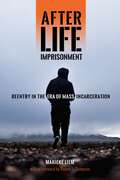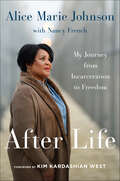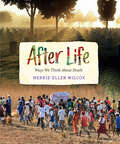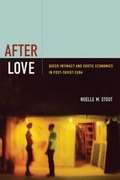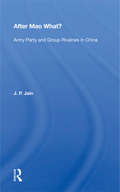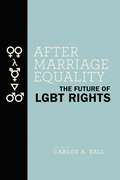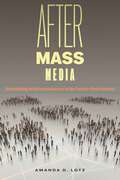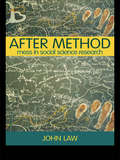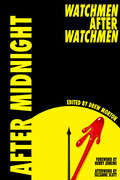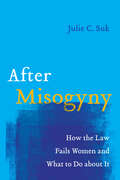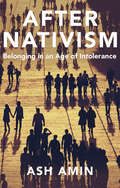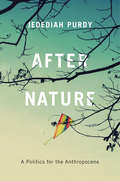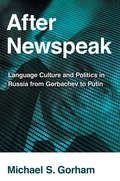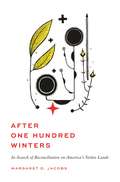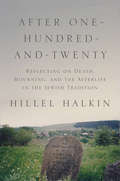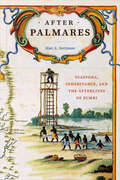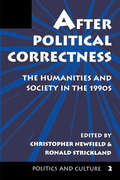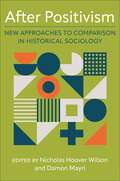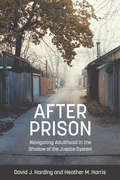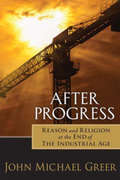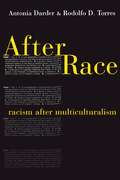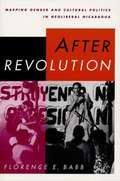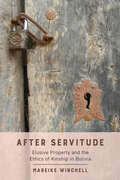- Table View
- List View
After Life Imprisonment: Reentry in the Era of Mass Incarceration (New Perspectives in Crime, Deviance, and Law #13)
by Marieke LiemOne out of every ten prisoners in the United States is serving a life sentence—roughly 130,000 people. While some have been sentenced to life in prison without parole, the majority of prisoners serving ‘life’ will be released back into society. But what becomes of those people who reenter the everyday world after serving life in prison?In After Life Imprisonment, Marieke Liem carefully examines the experiences of “lifers” upon release. Through interviews with over sixty homicide offenders sentenced to life but granted parole, Liem tracks those able to build a new life on the outside and those who were re-incarcerated. The interviews reveal prisoners’ reflections on being sentenced to life, as well as the challenges of employment, housing, and interpersonal relationships upon release. Liem explores the increase in handing out of life sentences, and specifically provides a basis for discussions of the goals, costs, and effects of long-term imprisonment, ultimately unpacking public policy and discourse surrounding long-term incarceration. A profound criminological examination, After Life Imprisonment reveals the untold, lived experiences of prisoners before and after their life sentences.
After Life: My Journey from Incarceration to Freedom
by Nancy French Alice Marie JohnsonForeword by Kim Kardashian WestThe true-life story of the woman whose life sentence for non-violent drug trafficking was commuted by President Donald Trump thanks to the efforts of Kim Kardashian West—an inspiring memoir of faith, hope, mercy, and gratitude.How do you hold on to hope after more than twenty years of imprisonment? For Alice Marie Johnson the answer lies with God.For years, Alice lived a normal life without a criminal record—she was a manager at FedEx, a wife, and a mother. But after an emotionally and financially tumultuous period in her life left her with few options, she turned to crime as a way to pay off her mounting debts. Convicted in 1996 for her nonviolent involvement in a Memphis cocaine trafficking organization, Alice received a life sentence under the mandatory sentencing laws of the time. Locked behind bars, Alice looked to God. Eventually becoming an ordained minister, she relied on her faith to sustain hope over more than two decades—until 2018, when the president commuted her sentence at the behest of Kim Kardashian West, who had taken up Alice’s cause.In this honest, faith-driven memoir, Alice explains how she held on to hope and gave it to others, from becoming a playwright to mentoring her fellow prisoners. She reveals how Christianity and her unshakeable belief in God helped her persevere and inspired her to share her faith in a video that would go viral—and come to the attention of celebrities who were moved to action.Today, Alice is an icon for the prison reform movement and a humble servant who embraces gratitude and God for her freedom. In this powerful book, she recalls all of the firsts she has experienced through her activism and provides an authentic portrait of the crisis that is mass incarceration. Linking social justice to spiritual faith, she makes a persuasive and poignant argument for justice that transcends tribal politics. Her story is a beacon in the darkness of despair, reminding us of the power of redemption and the importance of making second chances count.After Life features 16 pages of color photographs.
After Life: Ways We Think About Death
by Merrie-Ellen WilcoxWhy do we die? Why can't we live forever? What happens to us after death? Moving between science and culture, After Life: Ways We Think About Death takes a straightforward look at these and other questions long taboo in our society. <P><P>By showing the fascinating, diverse ways in which we understand death, both today and throughout our history, the book also shines a light on what it is to be human. Each chapter includes a brief telling of a death legend, myth or history from a different culture or tradition, from Adam and Eve to Wolf and Coyote, and ends with a section on a common theme in our thinking about death, such as rivers and birds in the afterlife, the colors that different cultures use to symbolize death, and, of course, ghosts. The final chapter is about grief, which is both a universal human experience and unique to each person. The text offers suggestions for ways to think about our grief, when to ask for help and how to talk to friends who are grieving.
After Love: Queer Intimacy and Erotic Economies in Post-Soviet Cuba
by Noelle M. StoutFocused on the intimate effects of large-scale economic transformations, After Love illuminates the ways that everyday efforts to imagine, resist, and enact market reforms shape sexual desires and subjectivities. Anthropologist Noelle M. Stout arrived in Havana in 2002 to study the widely publicized emergence of gay tolerance in Cuba but discovered that the sex trade was dominating everyday discussions among gays, lesbians, and travestis. Largely eradicated after the Revolution, sex work, including same-sex prostitution, exploded in Havana when the island was opened to foreign tourism in the early 1990s. The booming sex trade led to unprecedented encounters between Cuban gays and lesbians, and straight male sex workers and foreign tourists. As many gay Cuban men in their thirties and forties abandoned relationships with other gay men in favor of intimacies with straight male sex workers, these bonds complicated ideas about "true love" for queer Cubans at large. From openly homophobic hustlers having sex with urban gays for room and board, to lesbians disparaging sex workers but initiating relationships with foreign men for money, to gay tourists espousing communist rhetoric while handing out Calvin Klein bikini briefs, the shifting economic terrain raised fundamental questions about the boundaries between labor and love in late-socialist Cuba.
After Mao What/h
by J. P. JainMao Tse-tung has dominated the Chinese domestic scene for well over four decades now. Ever since the 1935 Tsunyi Conference, he has been successful in asserting his leadership over the Chinese Communist Party and the People's Liberation Army-the two main loci of power within China. However, in the process, Mao has had to face many a challenge to his authority. At times, it appeared as if the reins of control over the Party and the PLA were slipping out of his hands and that. the country was relapsing into a period of warlordism, or head-ing towards army dictatorship or rule by a Party hierarchy, not loyal to Mao and his dogma. But Chairman Mao has somehow managed to retain his supremacy over the major components of the Chinese political system by deposing or liquidating all those who dared usurp his throne. Mao's successors are unlikely to have either the charismatic personality or the stature of the great helmsman. Therefore, what follows after Mao is a matter of great significance and acute concern for both the Chinese people and the world at large.
After Marriage Equality: The Future of LGBT Rights
by Carlos A. BallExamines the impact of marriage equality on the future of LGBT rightsIn persuading the Supreme Court that same-sex couples have a constitutional right to marry, the LGBT rights movement has achieved its most important objective of the last few decades. Throughout its history, the marriage equality movement has been criticized by those who believe marriage rights were a conservative cause overshadowing a host of more important issues. Now that nationwide marriage equality is a reality, everyone who cares about LGBT rights must grapple with how best to promote the interests of sexual and gender identity minorities in a society that permits same-sex couples to marry. This book brings together 12 original essays by leading scholars of law, politics, and society to address the most important question facing the LGBT movement today: What does marriage equality mean for the future of LGBT rights?After Marriage Equality explores crucial and wide-ranging social, political, and legal issues confronting the LGBT movement, including the impact of marriage equality on political activism and mobilization, antidiscrimination laws, transgender rights, LGBT elders, parenting laws and policies, religious liberty, sexual autonomy, and gender and race differences. The book also looks at how LGBT movements in other nations have responded to the recognition of same-sex marriages, and what we might emulate or adjust in our own advocacy. Aiming to spark discussion and further debate regarding the challenges and possibilities of the LGBT movement’s future, After Marriage Equality will be of interest to anyone who cares about the future of sexual equality.
After Mass Media: Storytelling for Microaudiences in the Twenty-First Century (Critical Cultural Communication)
by Amanda D. LotzExplores the cultural role of screen storytelling in societyWith significant evolutions in digital technologies and media distribution in the past two decades, the business of storytelling through screens has shifted dramatically. In the past, blockbuster movies and TV shows like Friends aimed first for domestic mass audiences, although the biggest hits circulated globally. Now, transnational distribution plays a primary role and imagined audiences are global. At the same time, the once-mass audience has significantly fragmented to enable an expansion in the range of commercially viable stories, as evident in series as varied as Atlanta, Better Things, and dozens of others that are not widely known, but deeply loved by their microaudiences.Delving into the changing landscape of commercial screen storytelling, After Mass Media explores how industrial shifts and technological advancements have remade the narrative landscape over the past two decades. Television and movies have long shaped society, whether by telling us about the worlds around us or far away. By examining the internationalization of screen businesses, the rise of streaming services with multi-territory reach, and the stories made for this environment, this book sheds light on the profound transformations in television and film production and circulation. With a keen focus on major changes in the types of screen stories being told, Amanda D. Lotz unravels the industrial roots that made these transformations possible, challenges some conventional distinctions of screen storytelling, and provides new conceptual tools to make sense of the abundance and range of screen stories on offer.Through its comprehensive analysis, After Mass Media exposes how contemporary industrial dynamics, particularly the erosion of traditional distribution models based on geography and mass audience reach, have far-reaching implications for our understanding of national video cultures.
After Method: Mess in Social Science Research (International Library of Sociology)
by John LawJohn Law argues that methods don't just describe social realities but are also involved in creating them. The implications of this argument are highly significant. If this is the case, methods are always political, and it raises the question of what kinds of social realities we want to create. Most current methods look for clarity and precision. It is usually said that only poor research produces messy findings, and the idea that things in the world might be fluid, elusive, or multiple is unthinkable. Law's startling argument is that this is wrong and it is time for a new approach. Many realities, he says, are vague and ephemeral. If methods want to know and help to shape the world, then they need to reinvent themselves and their politics to deal with mess. That is the challenge. Nothing less will do.
After Midnight: Watchmen after Watchmen
by Suzanne ScottContributions by Apryl Alexander, Alisia Grace Chase, Brian Faucette, Laura E. Felschow, Lindsay Hallam, Rusty Hatchell, Dru Jeffries, Henry Jenkins, Jeffrey SJ Kirchoff, Curtis Marez, James Denis McGlynn, Brandy Monk-Payton, Chamara Moore, Drew Morton, Mark C. E. Peterson, Jayson Quearry, Zachary J. A. Rondinelli, Suzanne Scott, David Stanley, Sarah Pawlak Stanley, Tracy Vozar, and Chris Yogerst Alan Moore and Dave Gibbons’s Watchmen fundamentally altered the perception of American comic books and remains one of the medium’s greatest hits. Launched in 1986—“the year that changed comics” for most scholars in comics studies—Watchmen quickly assisted in cementing the legacy that comics were a serious form of literature no longer defined by the Comics Code era of funny animal and innocuous superhero books that appealed mainly to children. After Midnight: “Watchmen” after “Watchmen” looks specifically at the three adaptations of Moore and Gibbons’s Watchmen—Zack Snyder’s Watchmen film (2009), Geoff Johns’s comic book sequel Doomsday Clock (2017), and Damon Lindelof’s Watchmen series on HBO (2019). Divided into three parts, the anthology considers how the sequels, especially the limited series, have prompted a reevaluation of the original text and successfully harnessed the politics of the contemporary moment into a potent relevancy. The first part considers the various texts through conceptions of adaptation, remediation, and transmedia storytelling. Part two considers the HBO series through its thematic focus on the relationship between American history and African American trauma by analyzing how the show critiques the alt-right, represents intergenerational trauma, illustrates alternative possibilities for Black representation, and complicates our understanding of how the mechanics of the show’s production can impact its politics. Finally, the book’s last section considers the themes of nostalgia and trauma, both firmly rooted in the original Moore and Gibbons series, and how the sequel texts reflect and refract upon those often-intertwined phenomena.
After Misogyny: How the Law Fails Women and What to Do about It
by Julie C. SukA rigorous analysis of systemic misogyny in the law and a thoughtful exploration of the tools needed to transcend it through constitutional change beyond litigation in the courts. Just as racism is embedded in the legal system, so is misogyny—even after the law proclaims gender equality and criminally punishes violence against women. In After Misogyny, Julie C. Suk shows that misogyny lies not in animus but in the overempowerment of men and the overentitlement of society to women's unpaid labor and undervalued contributions. This is a book about misogyny without misogynists. From antidiscrimination law to abortion bans, the law fails women by keeping society's dependence on women's sacrifices invisible. Via a tour of constitutional change around the world, After Misogyny shows how to remake constitutional democracy. Women across the globe are going beyond the antidiscrimination paradigm of American legal feminism and fundamentally resetting baseline norms and entitlements. That process, what Suk calls a "constitutionalism of care," builds the public infrastructure that women's reproductive work has long made possible for free.
After Nativism: Belonging in an Age of Intolerance
by Ash AminIncreasingly, many people in democracies are turning to a strongarm politics for reassurance against globalization, uncertainty and precarity. In countries ranging from the US and the UK to Brazil, India and Turkey, support has grown for a nativist politics attacking migrants, minorities, liberals and elites as enemies of the nation. Is there a politics of belonging that progressive forces could mobilize to counteract these trends? After Nativism takes up this question, arguing that disarming nativism will require more than improving the security and wellbeing of the ‘left-behind’. The lines drawn by nativism are of an affective nature about imagined community, with meanings of belonging and voice lying at the heart of popular perceptions of just dues. This, argues Ash Amin, is the territory that progressive forces – liberal, social democratic, socialist – need to reclaim in order to shift public sentiment away from xenophobic intolerance towards one of commonality amid difference as a basis for facing existential risk and uncertainty. The book proposes a relational politics of belonging premised on the encounter, fugitive aesthetics, public interest politics, collaboration over common existential threats, and daily collectives and infrastructures of wellbeing. There is ground for progressives to mount a counter-aesthetics of belonging that will convince the discontents of neoliberal globalization that there is a better alternative to nativism.
After Nature: A Politics for the Anthropocene
by Jedediah PurdyNature no longer exists apart from humanity. Henceforth, the world we will inhabit is the one we have made. Geologists have called this new planetary epoch the Anthropocene, the Age of Humans. The geological strata we are now creating record industrial emissions, industrial-scale crop pollens, and the disappearance of species driven to extinction. Climate change is planetary engineering without design. These facts of the Anthropocene are scientific, but its shape and meaning are questions for politics - a politics that does not yet exist. After Nature develops a politics for this post-natural world.
After Newspeak: Language Culture and Politics in Russia from Gorbachev to Putin
by Michael S. GorhamIn After Newspeak, Michael S. Gorham presents a cultural history of the politics of Russian language from Gorbachev and glasnost to Putin and the emergence of new generations of Web technologies. Gorham begins from the premise that periods of rapid and radical change both shape and are shaped by language. He documents the role and fate of the Russian language in the collapse of the USSR and the decades of reform and national reconstruction that have followed. Gorham demonstrates the inextricable linkage of language and politics in everything from dictionaries of profanity to the flood of publications on linguistic self-help, the speech patterns of the country's leaders, the blogs of its bureaucrats, and the official programs promoting the use of Russian in the so-called "near abroad."Gorham explains why glasnost figured as such a critical rhetorical battleground in the political strife that led to the Soviet Union's collapse and shows why Russians came to deride the newfound freedom of speech of the 1990s as little more than the right to swear in public. He assesses the impact of Medvedev's role as Blogger-in-Chief and the role Putin's vulgar speech practices played in the restoration of national pride. And he investigates whether Internet communication and new media technologies have helped to consolidate a more vibrant democracy and civil society or if they serve as an additional resource for the political technologies manipulated by the Kremlin.
After One Hundred Winters: In Search of Reconciliation on America's Stolen Lands
by Professor Margaret D. JacobsA necessary reckoning with America’s troubled history of injustice to Indigenous peopleAfter One Hundred Winters confronts the harsh truth that the United States was founded on the violent dispossession of Indigenous people and asks what reconciliation might mean in light of this haunted history. In this timely and urgent book, settler historian Margaret Jacobs tells the stories of the individuals and communities who are working together to heal historical wounds—and reveals how much we have to gain by learning from our history instead of denying it.Jacobs traces the brutal legacy of systemic racial injustice to Indigenous people that has endured since the nation’s founding. Explaining how early attempts at reconciliation succeeded only in robbing tribal nations of their land and forcing their children into abusive boarding schools, she shows that true reconciliation must emerge through Indigenous leadership and sustained relationships between Indigenous and non-Indigenous people that are rooted in specific places and histories. In the absence of an official apology and a federal Truth and Reconciliation Commission, ordinary people are creating a movement for transformative reconciliation that puts Indigenous land rights, sovereignty, and values at the forefront. With historical sensitivity and an eye to the future, Jacobs urges us to face our past and learn from it, and once we have done so, to redress past abuses.Drawing on dozens of interviews, After One Hundred Winters reveals how Indigenous people and settlers in America today, despite their troubled history, are finding unexpected gifts in reconciliation.
After One-Hundred-and-Twenty: Reflecting on Death, Mourning, and the Afterlife in the Jewish Tradition
by Hillel HalkinAfter One-Hundred-and-Twenty provides a richly nuanced and deeply personal look at Jewish attitudes and practices regarding death, mourning, and the afterlife as they have existed and evolved from biblical times to today. Taking its title from the Hebrew and Yiddish blessing to live to a ripe old age--Moses is said to have been 120 years old when he died--the book explores how the Bible's original reticence about an afterlife gave way to views about personal judgment and reward after death, the resurrection of the body, and even reincarnation. It examines Talmudic perspectives on grief, burial, and the afterlife, shows how Jewish approaches to death changed in the Middle Ages with thinkers like Maimonides and in the mystical writings of the Zohar, and delves into such things as the origins of the custom of reciting Kaddish for the deceased and beliefs about encountering the dead in visions and dreams.After One-Hundred-and-Twenty is also Hillel Halkin's eloquent and disarmingly candid reflection on his own mortality, the deaths of those he has known and loved, and the comfort he has and has not derived from Jewish tradition.
After Palmares: Diaspora, Inheritance, and the Afterlives of Zumbi (Radical Perspectives)
by Marc A HertzmanIn After Palmares, Marc A. Hertzman tells the rise, fall, and afterlives of Palmares, one of history’s largest and longest-lasting maroon societies. Forged during the seventeenth century by formerly enslaved Africans in what would become northeast Brazil, Palmares stood for a century, withstanding sustained attacks from two European powers. In 1695, colonial forces assassinated its most famous leader, Zumbi. Hertzman examines the remarkable ways that Palmares and its inhabitants lived on after Zumbi’s death, creating vivid portraits of those whose lives and voices scholars have often assumed are inaccessible. With an innovative approach to African languages, and paying close attention to place as well as African and diasporic spiritual beliefs, Hertzman reshapes our understanding of Palmares and Zumbi and advances a new framework for studying fugitive slave communities and marronage in the African diaspora.
After Political Correctness: The Humanities and Society in the 1990s
by Christopher NewfieldThis book resituates the political correctness debates in the humanities branch of the academy. Contending that conservatives have tainted entire academic disciplines, causing university humanists to go from irrelevant to dangerous overnight, the contributors see the PC debates as a struggle over the very purposes of higher education in the United States. Ronald Strickland and Christopher Newfield have assembled the best and the brightest from across the academic disciplines for disclosure on the future of higher education in light of PC.
After Positivism: New Approaches to Comparison in Historical Sociology
by Wilson, Nicholas Hoover; Mayrl, DamonWhat is the value of comparison for research in historical sociology? Today, social scientists regularly express doubt about the positivist premises that have long justified comparison’s use: that cases can be unproblematically compared as though they are independent of one another, that comparison can reliably yield valid causal inference, and that comparative methods can grapple with questions of meaning, sequence, and process that are central to historical explanation. Yet they remain reluctant to abandon comparison altogether, not least because comparisons are still manifestly useful in the research process.After Positivism presents a bold new set of warrants and methodologies for comparison that takes these criticisms fully into account. The contributors to this book marshal a wide array of postpositivist approaches to knowledge to reconstruct the analytic potential of comparison for a new generation of social scientists. In addition to providing fresh answers to classic questions about case selection and causal inference, authors ponder the role comparison plays in a world where social phenomena are demonstrably time-, space-, and concept-dependent; where causation is typically conjunctural; where social structures and groups emerge and die; and where important objects of inquiry can be understood only in terms of relationships, emergent properties, or contingent and irregular effects. Engaging and timely, this book will be of interest to all those who seek to improve our explanations of historical change in social-scientific research.
After Prison: Navigating Adulthood in the Shadow of the Justice System
by David J. Harding Heather M. HarrisThe incarceration rate in the United States is the highest of any developed nation, with a prison population of approximately 2.3 million in 2016. Over 700,000 prisoners are released each year, and most face significant educational, economic, and social disadvantages. In After Prison, sociologist David Harding and criminologist Heather Harris provide a comprehensive account of young men’s experiences of reentry and reintegration in the era of mass incarceration. They focus on the unique challenges faced by 1,300 black and white youth aged 18 to 25 who were released from Michigan prisons in 2003, investigating the lives of those who achieved some measure of success after leaving prison as well as those who struggled with the challenges of creating new lives for themselves. The transition to young adulthood typically includes school completion, full-time employment, leaving the childhood home, marriage, and childbearing, events that are disrupted by incarceration. While one quarter of the young men who participated in the study successfully transitioned into adulthood—achieving employment and residential independence and avoiding arrest and incarceration—the same number of young men remained deeply involved with the criminal justice system, spending on average four out of the seven years after their initial release re-incarcerated. Not surprisingly, whites are more likely to experience success after prison. The authors attribute this racial disparity to the increased stigma of criminal records for blacks, racial discrimination, and differing levels of social network support that connect whites to higher quality jobs. Black men earn less than white men, are more concentrated in industries characterized by low wages and job insecurity, and are less likely to remain employed once they have a job. The authors demonstrate that families, social networks, neighborhoods, and labor market, educational, and criminal justice institutions can have a profound impact on young people’s lives. Their research indicates that residential stability is key to the transition to adulthood. Harding and Harris make the case for helping families, municipalities, and non-profit organizations provide formerly incarcerated young people access to long-term supportive housing and public housing. A remarkably large number of men in this study eventually enrolled in college, reflecting the growing recognition of college as a gateway to living wage work. But the young men in the study spent only brief spells in college, and the majority failed to earn degrees. They were most likely to enroll in community colleges, trade schools, and for-profit institutions, suggesting that interventions focused on these kinds of schools are more likely to be effective. The authors suggest that, in addition to helping students find employment, educational institutions can aid reentry efforts for the formerly incarcerated by providing supports like childcare and paid apprenticeships. After Prison offers a set of targeted policy interventions to improve these young people’s chances: lifting restrictions on federal financial aid for education, encouraging criminal record sealing and expungement, and reducing the use of incarceration in response to technical parole violations. This book will be an important contribution to the fields of scholarly work on the criminal justice system and disconnected youth.
After Prison: Navigating Adulthood in the Shadow of the Justice System
by David J. Harding Heather M. HarrisThe incarceration rate in the United States is the highest of any developed nation, with a prison population of approximately 2.3 million in 2016. Over 700,000 prisoners are released each year, and most face significant educational, economic, and social disadvantages. In After Prison, sociologist David Harding and criminologist Heather Harris provide a comprehensive account of young men’s experiences of reentry and reintegration in the era of mass incarceration. They focus on the unique challenges faced by 1,300 black and white youth aged 18 to 25 who were released from Michigan prisons in 2003, investigating the lives of those who achieved some measure of success after leaving prison as well as those who struggled with the challenges of creating new lives for themselves. The transition to young adulthood typically includes school completion, full-time employment, leaving the childhood home, marriage, and childbearing, events that are disrupted by incarceration. While one quarter of the young men who participated in the study successfully transitioned into adulthood—achieving employment and residential independence and avoiding arrest and incarceration—the same number of young men remained deeply involved with the criminal justice system, spending on average four out of the seven years after their initial release re-incarcerated. Not surprisingly, whites are more likely to experience success after prison. The authors attribute this racial disparity to the increased stigma of criminal records for blacks, racial discrimination, and differing levels of social network support that connect whites to higher quality jobs. Black men earn less than white men, are more concentrated in industries characterized by low wages and job insecurity, and are less likely to remain employed once they have a job. The authors demonstrate that families, social networks, neighborhoods, and labor market, educational, and criminal justice institutions can have a profound impact on young people’s lives. Their research indicates that residential stability is key to the transition to adulthood. Harding and Harris make the case for helping families, municipalities, and non-profit organizations provide formerly incarcerated young people access to long-term supportive housing and public housing. A remarkably large number of men in this study eventually enrolled in college, reflecting the growing recognition of college as a gateway to living wage work. But the young men in the study spent only brief spells in college, and the majority failed to earn degrees. They were most likely to enroll in community colleges, trade schools, and for-profit institutions, suggesting that interventions focused on these kinds of schools are more likely to be effective. The authors suggest that, in addition to helping students find employment, educational institutions can aid reentry efforts for the formerly incarcerated by providing supports like childcare and paid apprenticeships. After Prison offers a set of targeted policy interventions to improve these young people’s chances: lifting restrictions on federal financial aid for education, encouraging criminal record sealing and expungement, and reducing the use of incarceration in response to technical parole violations. This book will be an important contribution to the fields of scholarly work on the criminal justice system and disconnected youth.
After Progress: Reason and Religion at the End of the Industrial Age
by John Michael GreerThe acclaimed climate futurist examines our unquestioning faith in progress, and its limits in the face of peak oil and climate change. Since the Industrial Age began, scientific and technological progress has been nothing short of miraculous. As a result, progress itself has become the new religion of the West. Our faith in it is so complete that many of us ignore the perils of peak oil and climate change, believing that our lab-coated high priests will surely bring forth yet another miracle to save us all. Unfortunately, progress as we've known it has been entirely dependent on the breakneck exploitation of half a billion years of stored sunlight in the form of fossil fuels. As the age of this cheap, abundant energy draws to a close, progress is grinding to a halt. Unforgiving planetary limits are teaching us that our blind faith in endless exponential growth is a dangerous myth.After Progress addresses this looming paradigm shift, exploring the shape of history from a perspective on the far side of the coming crisis. With a startling examination of the role our belief systems play in our collective fate, John Michael Greer makes a persuasive argument for seeking new sources of meaning, value, and hope for the era ahead.
After Race: Racism After Multiculturalism
by Rodolfo D. Torres Antonia DarderAfter Race pushes us beyond the old "race vs. class" debates to delve deeper into the structural conditions that spawn racism. Darder and Torres place the study of racism forthrightly within the context of contemporary capitalism. While agreeing with those who have argued that the concept of "race" does not have biological validity, they go further to insist that the concept also holds little political, symbolic, or descriptive value when employed in social science and policy research.Darder and Torres argue for the need to jettison the concept of "race," while calling adamantly for the critical study of racism. They maintain that an understanding of structural class inequality is fundamentally germane to comprehending the growing significance of racism in capitalist America.
After Revolution: Mapping Gender and Cultural Politics in Neoliberal Nicaragua
by Babb Florence E.Nicaragua's Sandinista revolution (1979-1990) initiated a broad program of social transformation to improve the situation of the working class and poor, women, and other non-elite groups through agrarian reform, restructured urban employment, and wide access to health care, education, and social services. This book explores how Nicaragua's least powerful citizens have fared in the years since the Sandinista revolution, as neoliberal governments have rolled back these state-supported reforms and introduced measures to promote the development of a market-driven economy. Drawing on ethnographic research conducted throughout the 1990s, Florence Babb describes the negative consequences that have followed the return to a capitalist path, especially for women and low-income citizens. In addition, she charts the growth of women's and other social movements (neighborhood, lesbian and gay, indigenous, youth, peace, and environmental) that have taken advantage of new openings for political mobilization. Her ethnographic portraits of a low-income barrio and of women's craft cooperatives powerfully link local, cultural responses to national and global processes.
After Servitude: Elusive Property and the Ethics of Kinship in Bolivia
by Dr. Mareike WinchellHow are injurious pasts redeployed by the dispossessed? After Servitude explores how agrarian engineers, Indigenous farmers, Mestizo mining bosses, and rural workers navigate racial hierarchies rooted in histories of forced agrarian labor. In the rural Bolivian province of Ayopaya, where the liberatory promises of property remain elusive, Quechua people address such hierarchies by demanding aid from Mestizo elites and, when that fails, through acts of labor militancy. Against institutional faith in property ownership as a means to detach land from people and present from past, the kin of former masters and servants alike have insisted that ethical debts from earlier racial violence stretch across epochs and formal land sales. What emerges is a vision of justice grounded in popular demands that wealth remain beholden to the region’s agrarian past. By tracing Ayopayans’ active efforts to contend with servitude’s long shadow, Mareike Winchell illuminates the challenges that property confronts as both an extractive paradigm and a means of historical redress.
After Sex?: On Writing Since Queer Theory
by Janet Halley Andrew ParkerSince queer theory originated in the early 1990s, its insights and modes of analysis have been taken up by scholars across the humanities and social sciences. In After Sex? prominent contributors to the development of queer studies offer personal reflections on the field's history, accomplishments, potential, and limitations. They consider the purpose of queer theory and the extent to which it is or is not defined by its engagement with sex and sexuality. For many of the contributors, a broad notion of sexuality is essential to queer thought. At the same time, some of them caution against creating an all-embracing idea of queerness, because it empties the term "queer" of meaning and assumes the universality of ideas developed in the North American academy. Some essays recall the political urgency of the late 1980s and early 1990s, when gay and lesbian activist and queer theory projects converged in response to the AIDS crisis. Other pieces exemplify more recent trends in queer critique, including the turn to affect and the debates surrounding the "antisocial thesis," which associates queerness with the repudiation of heteronormative forms of belonging. Contributors discuss queer theory's engagement with questions of transnationality and globalization, temporality and historical periodization. Meditating on the past and present of queer studies, After Sex? illuminates its future. Contributors. Lauren Berlant, Leo Bersani, Michael Cobb, Ann Cvetkovich, Lee Edelman, Richard Thompson Ford, Carla Freccero, Elizabeth Freeman, Jonathan Goldberg, Janet Halley, Neville Hoad, Joseph Litvak, Heather Love, Michael Lucey, Michael Moon, Jos Esteban Muoz, Jeff Nunokawa, Andrew Parker, Elizabeth A. Povinelli, Richard Rambuss, Erica Rand, Bethany Schneider, Eve Kosofsky Sedgwick, Kate Thomas
